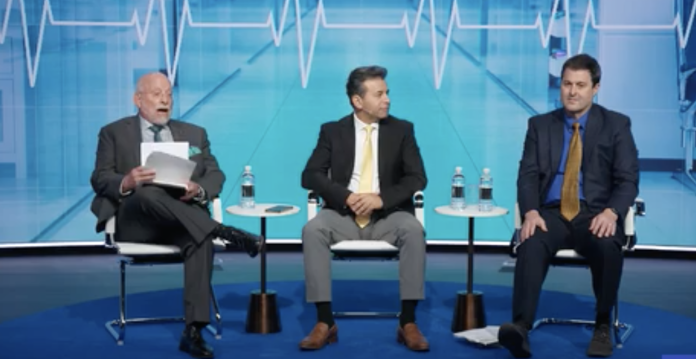Medicine has a huge “blind spot” that has led to an explosion of childhood obesity, diabetes, autism, peanut allergies, and autoimmune diseases in the United States, says Martin Makary, M.D., author of the bestselling book Blind Spots.
“We have the sickest population in the history of the world … right here in the United States, despite spending double what other wealthy countries spend on health care,” said Makary during a September 20 presentation at the Cato Institute, titled “Blind Spots: When Medicine Gets It Wrong, and What It Means for Our Health.” Also on the panel were Cato scholars Jeffrey A. Singer, M.D., and David A. Hyman, M.D.
Makary became well-known during the COVID-19 lockdowns as one of a small group of prominent physicians who publicly questioned the government’s response to the virus. Makary is a professor of surgery at Johns Hopkins Medicine, where he researches the underlying causes of disease and has written numerous scientific articles and two other bestselling books.
Chronic-Disease Epidemics
Makary said the rates of some diseases have reached epidemic proportions. Half of all children in the United States are obese or overweight, with 20 percent now diabetic or prediabetic. The rate of children being diagnosed with autism is up 14 percent every year for the last 23 years, one in five U.S. women have been diagnosed with an autoimmune disease, and gastrointestinal cancers have doubled in the last two decades.
“We have got to ask the big questions,” said Makary said in his remarks. “We have developed blind spots not because we’re bad people but because the system has a groupthink, a herd mentality.”
Health care has become assembly-line medicine, with health professionals pressured to focus more on productivity and billing output than on improving overall health, says Makary.
“We need to look at gut health, the microbiome, our poisoned food supply; maybe we need to look at environmental exposures that cause cancer, not just the chemo to treat it; maybe treat diabetes with cooking classes instead of throwing meds at people; maybe we need to treat high blood pressure by talking about sleep quality,” said Makary.
Sticky Theories
Hyman says cognitive dissonance can cause blind spots, highlighting an example of a surgeon initially resistant to trying less-invasive antibiotics before surgically removing an appendix, as recounted in Makary’s book.
“Easy problems are already fixed, so how do we fix this hard problem?” said Hyman at the presentation, pointing out unjustified medical opinions can persist for decades.
Such opinions include the ideas that “opioids are not addictive, or antibiotics won’t hurt you, or hormone therapy causes breast cancer even though the data never supported it, the dogma of the food pyramid,” said Makary.
“We love to hold on to old ideas not because they’re better or more logical or [more] scientifically supported than new information, but just because we heard it first,” said Makary. “And it gets comfortable. It will nest in the brain, and subconsciously we will defend it.”
Peanut Allergy Mixup
Singer asked Makary about the peanut allergy dogma the American Academy of Pediatrics pushed in 2000, recommending children not eat peanuts before the age of three. It turned out to be wrong, said Singer.
“We have peanut allergies in the U.S. at epidemic proportions, [yet] they don’t have them in Africa and parts of Europe and Asia,” said Makary. The United States “got it perfectly backward,” said Makary. “Peanut abstinence results in a sensitization at the immune-system level.”
An early introduction of peanuts reduces the incidence of people identified with peanut allergies at a rate of 86 percent, Makary told the audience.
Makary said he confronted those who argued for peanut abstinence, noting there were no studies to back up the recommendation. They replied that they felt compelled to weigh in because the public wanted something done, said Makary.
‘Demonized’ HRT
The recommendation against hormone replacement therapy (HRT) for older women because of breast cancer risk is another example of misguided groupthink, Makary told the audience.
“It is probably the biggest screw-up in modern medicine,” said Makary.
“HRT replaces estrogen when the body stops producing it,” said Makary. “Women who start it within 10 years after the onset of menopause live on average three and a half years longer, have healthier blood vessels, they will have 50 to 60 percent less cognitive decline, the risk of Alzheimer’s goes down by 35 percent. Women feel better and live longer. The rate of heart attacks goes down by half. And their bones are stronger. There is probably no medication that has a greater impact on health outcomes in populations than hormone therapy.”
A demonization campaign against HRT began 22 years ago when a single scientist at the National Institutes of Health held a press conference saying HRT was linked to breast cancer, Makary told the audience.
“The incredible back story is that no data were released at that announcement,” said Makary. “And today there is no statistically significant increase [of breast cancer].”
Political Challenges
Among the broad range of topics in the 75-minute discussion, the panelists considered how medical groupthink affects government policy.
“Agencies make decisions in the shadows of how [they think] Congress will react,” said Hyman. “Congress can make your life really miserable if you’re a federal regulator. They can cut your budget, call you in, and yell at you because you haven’t taken aggressive steps to protect the American public.”
Makary said doctors must avoid making recommendations based on “gut feelings.”
“We spend a staggering amount of money on delivering health care, and very little money on what actually works,” said Hyman.
AnneMarie Schieber (amschieber@heartland.org) is the managing editor of Health Care News.
For related articles, click here.





















